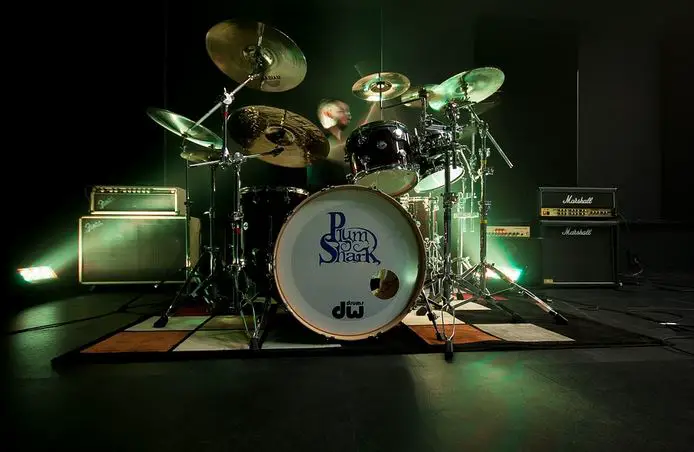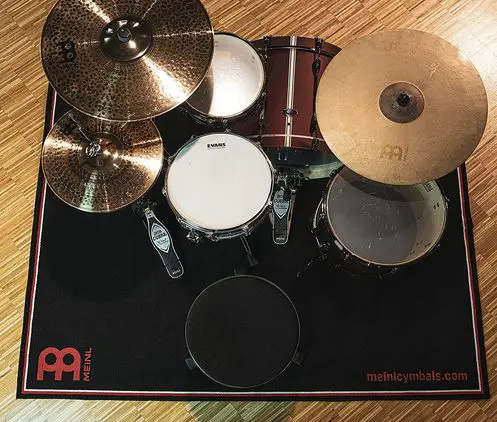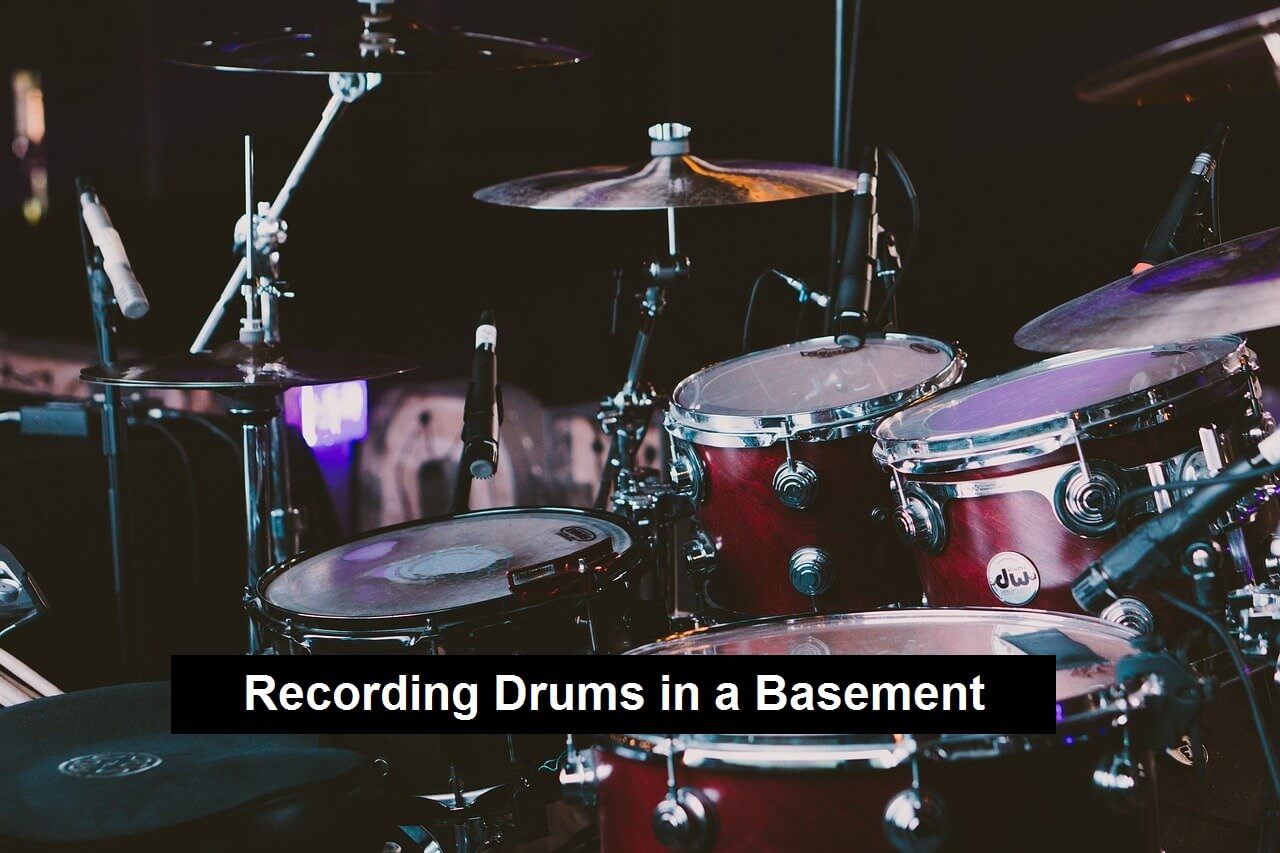This product list contains affiliate links. This means that at no extra cost to you, I may earn a commission if you use one of these links to make a purchase.
Last updated on June 12th, 2023 at 05:43 am
Recording drums in a basement can be a great experience and has its challenges. If not done correctly, you will end up with blaring noise that can drive your neighbors CRAZY.
In this mega guide for recording drums in a basement, we will cover EVERYTHING you need to know. And by the end of this, you’ll be able to record drums anywhere and soundproof your studio – even if it’s just a little room!
Can You Record Drums in a Basement?
In many cases, YES you can record drums in a basement if it’s possible to set up a drum room down there.
However it’s never quite perfect.
The size of the room and the distance between you and the drummer play an important role. The quality of your drumming will be affected by the distance between you and your drummer.
If you’re standing close to them, you’ll be able to hear the sound. It’ll be difficult to hear them if you’re more than 12 feet away.
Also Read: Evans G2 Clear Vs Remo Emperor
How Do Drums Sound in a Basement
The sound of a drum kit in a smaller room, such as a basement, might be very different to the sound of a drum set in a larger room, such as a concert hall.
The reason for this is due to the way sound bounces off of the ceilings and walls in the room.
Echoes are formed when sound waves travel through the air and then reflect off of surfaces after arriving at their destination.
If you play the drums in a basement instead of an open place with higher ceilings, you’ll notice a significant increase in the amount of echo. This is because there are fewer materials between the drum kit and the microphone, which results in fewer reflections that might cause the sound to become jumbled.
As a direct consequence of this change, your drummer will hear a greater proportion of their voice in comparison to the sounds of other instruments and the reverberation coming from behind them.
How to Improve Drum Sound in a Basement?
Basement drums will sound better with a few simple modifications.

First, make sure you have enough room and a calm place to work. In an apartment, this can be accomplished by laying down carpets or by having a large room with enough airflow.
Here are a few other tips for improving drum sound in your basement:
1) Invest in a drum isolation booth
An isolating booth is a great way to achieve the greatest possible drum sound in your basement.
This will prevent the room from absorbing unwanted frequencies and improve the sound quality. They’re expensive and space-inefficient, but they can help improve the sound quality of your drums.
2) Position your mic closer to the drum head than usual
The closer the mic is to the drum head, the better it will sound. This will keep the sound from bleeding into other parts of your room and give it more clarity and definition.
It’s also an easy way to improve low-frequency response without using bass traps or other heavy equipment.
If you have an acoustic kit, try positioning your mic about a foot away from it. You can experiment with different distances until you find one that works best for your room and drums.
3) Record close-miked drum sounds
When recording acoustic drums, it’s important to record them in the close-miked mode because that’s how they’re played live most of the time anyway.
This way you’ll capture all of their natural warmth and detail without losing any punch or clarity.
4) Use room mics for ambience and reverb (Optional)
These will help give your drums some depth and depth perception that they might not have otherwise had. If you don’t want to use room mics, then there are other ways of improving the sound quality.
How to Soundproof a Basement for Drums?
Here are some tips for soundproofing your basement for recording drums:
Find and Fix the Leaks
If you have a lot of leaks in your basement, the drum noise that will be heard by the neighbors is going to be a lot louder. Thus, sealing the major air leaks will reduce the noise.
The door is the most common location where air leaks occur. Using the Soundproof Weather Stripping Door Kit is an option if this is the case.
When applied correctly, the door will be secure on all sides. The drumset’s noise level will be reduced.
Make the Door Stronger
Hollow doors don’t do a good job of reducing noise pollution. Regardless of how much soundproofing material you put on the walls, if the door stays open, you won’t be able to keep the sounds from outside.
For the most effective solution, reinforce your door with soundproofing material. This can be done using plywood. Attach the material to the door and screw or glue it in place.
Make use of a Drum Rug
If your room or basement is composed of concrete, the drum set’s sound will be more audible. Therefore, it is necessary to add some soft materials that can absorb the sound to reduce noise.
The drum rug, such as the Meinl Cymbals MDR-BK Drum Rug, is the best material for drum rugs.
This rug helps to stabilize the drums while also REDUCING the amount of noise they make. To get the greatest results, place the rug on the floor where the drums are.

Carpeting the floor will make it more comfortable. The carpet also acts as an acoustical barrier.
Put in some Acoustic Foam
If the walls and ceilings of a basement are composed of concrete, you will have a difficult time controlling the noise because it will echo throughout the entire space.
The use of acoustic foam to cover both the ceiling and the walls is the most effective method that you can implement.
Acoustic foam panels do a pretty good job of lowering the echo, which in turn will help to reduce the noise that is being produced.
Use Thick Curtains to Cover the Windows
In addition to the doorway, the situation is exacerbated by the windows. It’s because windows are the room or basement’s weakest points.
The sound can be muffled with a heavy curtain. Use a heavy curtain if you decide to go this route. The better the outcomes, the thicker the curtain should be.
Also Read: Why Bass Drum Pedal Won’t Bounce Back
FAQs
How Loud Are Drums in a House?
What Is the Best Way to Record Drums at Home?
Set a kick mic.
Install a snare mic.
Overheads must be put in place.
Close-mic the remaining kit. (optional)


